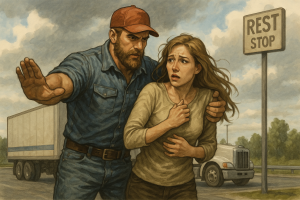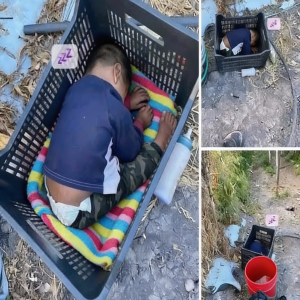On a summer evening in Tennessee, the highway rest area was unusually quiet. Truck driver Ron Ross had pulled over to stretch his legs, grab some coffee, and check his logbook before continuing his long drive. It was meant to be an ordinary stop, the kind truckers make countless times on the road. But what happened next transformed this unassuming moment into a life-saving act of courage that would capture the attention of the nation.
As Ross leaned against his truck sipping his coffee, his eyes caught sudden movement. A woman burst out from behind a line of trees, her face pale with fear, running barefoot across the gravel. Her arms were flailing as if begging for help. Only seconds later, a man appeared in pursuit, shouting at her angrily. Something was terribly wrong.
Ross didn’t hesitate. With years of instincts sharpened by life on the road, he quickly threw open the passenger side of his truck and shouted at the woman: “Get in, now!” She scrambled inside, sobbing uncontrollably. Ross slammed the door shut and locked it just as the man reached the side of the truck, pounding on the metal with his fists.
Instead of engaging with the aggressor, Ross used his CB radio and phone to alert state police. Within minutes, troopers arrived at the scene, their lights flashing against the dark highway backdrop. The man was restrained and taken into custody. Investigators later confirmed that the woman had been abducted earlier that day and had managed to escape only moments before Ross spotted her.
The woman’s statement was both chilling and heartbreaking. She described how she had been lured into the man’s vehicle and held against her will. Her chance for freedom came when he slowed down near the rest area. She bolted into the woods and ran until she saw Ross’s truck parked by the lot. “If he hadn’t been there,” she told officers, “I don’t know what would have happened to me.”
Ross remained humble through the ordeal. “I just did what anyone should do,” he told reporters later. “She needed help, and I was there. I’m just glad she’s safe.” But the internet disagreed with his modesty. News of the “Highway Angel” spread rapidly across social media. Videos of his interview were shared thousands of times. Memes and hashtags celebrating truck drivers as unsung heroes began trending.

Many viewers pointed out that long-haul truckers often serve as the eyes and ears of America’s highways. They notice stranded cars, dangerous accidents, and sometimes—like in this case—people in desperate need of help. Ross’s quick action was a reminder of how one person’s bravery can change the course of another’s life forever.
Psychologists interviewed in the aftermath explained why stories like this strike such a chord. They highlight the power of courage, compassion, and human instinct to protect others. In a society often divided by headlines of conflict, this story united people with a simple truth: heroes are not always in uniforms. Sometimes they wear baseball caps and drive eighteen-wheelers.
For Ross, the experience left a lasting impact. He admitted that he replayed the scene in his mind many times, realizing how easily he could have looked away or assumed nothing was wrong. “If I had ignored it, if I had thought, ‘That’s none of my business,’ she might not be alive today,” he said. His story became a call to action for others: to pay attention, to trust their instincts, and to step up when someone is in need.
The rescued woman is now recovering with her family, grateful for her second chance. Local community groups even organized a small celebration to honor Ross, presenting him with a plaque that read: “To Our Highway Hero—Thank You for Choosing Courage.”
Ross shrugged at the attention. “I’m just a guy doing my job,” he said with a smile. But for the woman he saved, and for the millions who read his story, he is much more than that. He is living proof that ordinary people can become extraordinary heroes in a matter of seconds.









